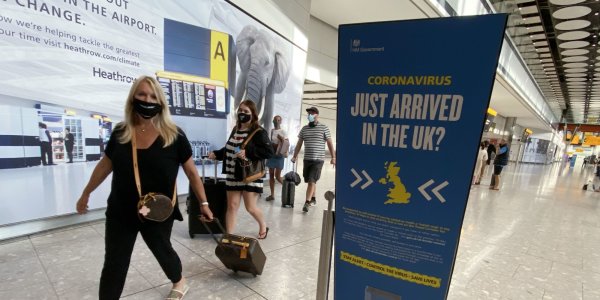How The New ‘Traffic Light’ Travel System Will Work And What It Will Mean For Holidays
5 min read
Ministers have announced new plans to ease travel restrictions from as early as next month in an effort to restart international travel. PoliticsHome explains the new system and how it will work for holidaymakers.
The newly announced plans are focussed on a “traffic light” system which will categorise countries based on a range of factors, including their vaccination and infection rates, and the presence of any new variants of Covid-19.
The recently established Global Travel Taskforce, who prepared the plans, claim the new system will allow travel to restart in a “accessible and affordable way” from 17 May at the earliest if the UK’s lockdown easing roadmap continues as planned.
Transport Secretary Grant Shapps said on Friday people could now “start to think” about booking foreign holidays, but warned the scheme hinges on the UK’s Covid cases remaining low and the vaccination programme continuing at pace.
The full list of countries is not due to be published for another few weeks in order to ensure the classifications are based on the most up-to-date data, but the requirements of travellers, including increased testing and hotel quarantine, have been published.
But what do the different ‘traffic lights’ mean for travellers?
Green Countries
People arriving from the least-risk countries will not be required to quarantine by default but will need to take a PCR test within 72 hours of departure to the UK and a second within two days of their arrival.
The test, which can cost around £120 will need to be pre-booked before arrival with a government approved supplier. Ministers have promised they will look into ways to reduce the cost so that the additional costs do not restrict travel for people on lower budgets.
This could include changing the requirements for passengers to take PCR tests, insteading allowing them to take “rapid” lateral flow tests, which the government has now made available to the wider population for free.  If you do test positive you would be required to quarantine at home.
If you do test positive you would be required to quarantine at home.
As with all destinations, travellers will be required to fill out “passenger locator forms”, which will list their travel history, their address they will be staying in once they arrive in the UK, the results of their pre-departure Covid tests, and booking details of their follow up tests.
Ministers have also pledged to introduce a new scheme by Autumn to digitise passenger locator forms so they can be recorded at electronic gates at border control.
Amber Countries
Anyone arriving from an Amber country will be required to quarantine at home for 10 days.
Similar to the Green list rules, a pre-departure test will be needed with further PCR tests on day two and day eight.
However, there will be an option to purchase an extra PCR test on day five under the “test to release” scheme. Getting a negative test result at that point would allow travellers to end their self-isolation early.
Red Countries
People arriving from the highest risk “red list” countries will be forced to quarantine in a specific hotel at a cost of £1,750.
Travel to and from Red Countries will remain banned for most people, with only British and Irish residents allowed to enter the UK from those countries.
The hotel quarantine plans have been in place since February, and require passengers arriving to have pre-booked and paid for their ‘quarantine package’ before arriving in the UK or face hefty fines. The packages include more comprehensive PCR tests on day two and day eight of their quarantine, but a negative test result does not allow them to leave early. Instead, those who test positive for the virus on their second test will be forced to remain in quarantine for several more days and have to pay for the extra days.
The packages include more comprehensive PCR tests on day two and day eight of their quarantine, but a negative test result does not allow them to leave early. Instead, those who test positive for the virus on their second test will be forced to remain in quarantine for several more days and have to pay for the extra days.
As with the Green and Amber requirements, those departing for Red list countries will be required to fill in Passenger Locator Forms and take a pre-departure test.
When Will We See The List?
The full list will not be available until we approach the 17 May deadline, but a prospective list could be announced within two to three weeks to give holidaymakers time to book their trips.
The government have said they will base their decision on the percentage of the population which has been vaccinated in a country, their infection rate, the existence of any Covid variants of concern, and their access to “genomic sequencing” to identify new strains of the virus.
The proposals also mention plans for a “green watchlist” which will give a warning when a Green country is at risk of being moved into the Amber group.
But Shapps said a warning period might not always be possible, saying the government “will not hesitate to act immediately” if circumstances in a country change quickly. Further work is also ongoing around the controversial ‘vaccine passport’ scheme which will allow passengers to demonstrate their vaccine status when travelling.
Further work is also ongoing around the controversial ‘vaccine passport’ scheme which will allow passengers to demonstrate their vaccine status when travelling.
The government said discussions were ongoing with foreign countries who have suggested that those who have been fully vaccinated will have fewer restrictions on arrival, with more plans to be announced ahead of the summer travel period.
While there are no firm commitments, the proposals could also mean benefits for inbound travellers who have been vaccinated, potentially allowing them to sidestep the testing and quarantine requirements in the UK.
